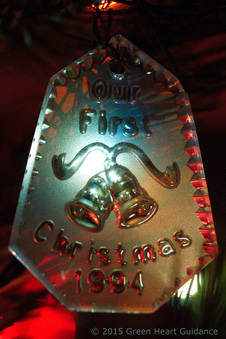 Waterford Commemorative Ornament
Waterford Commemorative Ornament
One of the more difficult times for “what we’ve always done” is when a new member joins the family, usually through marriage. As a new family unit is formed, the extended family has to shift its traditions a bit to welcome and accommodate the new member who also is coming from an extended family. However, some families don’t welcome new members with love. Instead, past tradition becomes more important than meeting the needs of the present members.
When I married my now ex-husband, I entered into a small extended family, most of whom lived in the same metropolitan area as my family. My ex has no first cousins as his paternal uncle and maternal aunt never married. The grandparents had no extended relations in the area either. It was just a small family gathering at Christmas time.
In contrast, my paternal aunt’s husband (my uncle by marriage) was one of seven children all of whom had married and had children. For their clan to get together, it took considerable arranging. They had held their holiday gathering on Christmas Day for a very long time in order to accommodate all the involved people. As a result, my paternal relatives gathered on Christmas Eve. There was really no way to change the meeting to Christmas Day if we also wanted my aunt and her nuclear family to join us.
Thus, when I married into my ex-husband’s family, we let them know we would be spending Christmas Eve with my family and Christmas Day with his. His parents protested that we should spend Christmas Eve with them even when we explained the dynamics of why my family could not change their gathering time. You would have thought we had declared his family unworthy of any celebration. The verdict from his parents came down, though: They would be opening presents on Christmas Eve, and if we wanted to partake, we would cancel our time with my family and join them because “this is how we’ve always done it.”
On Christmas Eve, we joined my family, and his family opened presents without us. There were no young kids involved in his family's gathering: I was actually the youngest one involved in the celebrations in that city. I was clearly able to wait a few more hours to open gifts, but the rest of them were not. What his family symbolically told us that year was that their traditions were far more important than making sure we were included. They were not going to change to welcome a new family member and her extended family into their world. They were going to do what they had always done and it was up to us to show our allegiance. Clearly I was annoyed (at best) by this uncharitable behavior. It had been painful enough to know that I was not welcomed with open arms to the family when we got engaged, but this further drove the point home that tradition meant more than current family members.
I spent the first 24 Christmases of my life in Missouri even though I only lived there for eight of those years. After one miserable Christmas in Austin, I returned to spending Christmas in Missouri for several more years. When my grandfather died, traditions changed again. I’ve never spent another Christmas in Missouri. And that is part of life. When change happens, it’s far more important to figure out what the loving thing is to do rather than trying to force a tradition onto a situation that may not be able to accommodate the ways of the past anymore.
© 2015 Elizabeth Galen, Ph.D., Green Heart Guidance, LLC
 RSS Feed
RSS Feed